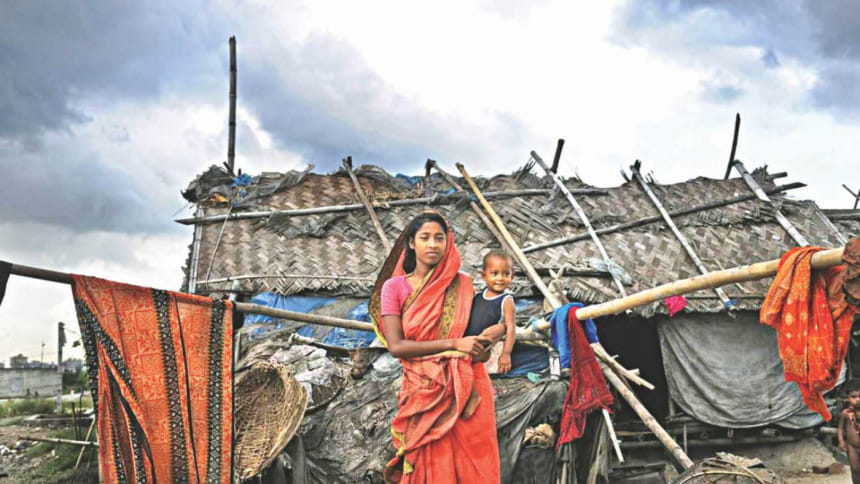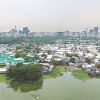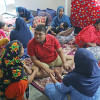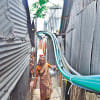Seeing colours in Korail

The Daily Star recently reported that at least 20 utilities "syndicates" are operating in Korail slum. The local police and several government bodies are also involved in the distribution scheme. For those not familiar with Dhaka's informal settlements, the details are alarming. The syndicates are associations of local residents who take on roles such as "lineman, rent collector, and manager," providing utilities in negotiated turf areas. Police officers and government utility employees take bribes to help establish and run the "unauthorised services."
These local utility associations provide at least 10,000 gas connections and 15,000 water and electricity connections to people living in Korail while making around Tk 1.5 crore per month, much of which goes into bribing government officials. Given the turf-based operational scheme, the slum occasionally experiences violent turf wars among the syndicates. The government officials interviewed referred to the utilities connections as dangerous, and one official went on to say that "he had lost count of how many times they have snapped illegal gas connections at Korail slum." All in all, Korail slum appears to be a criminal stronghold beyond the regulatory control of the government.
In public opinion, slums are often perceived as sites for hijacking, smuggling, drug dealing and other antisocial activities. The report on informal utilities providers seems to strengthen that perception and justify the eviction of Korail residents as an anti-crime measure. As the government moves forward with the plan for a high-tech park development in Korail, the fear of eviction, either by fire or force, looms large in the minds of the slum residents. To avoid lending credibility to the criminalisation of slum inhabitants and rationalising evictions, even as we face the facts, we must step back and pay closer attention to Korail's context.
Korail slum is home to at least 100,000 citizens who work in diverse sectors in the city. Without getting into the complicated push-and-pull factors that bring more than 70 people per hour to Dhaka, and the vulnerabilities of a slum life, we can say that the residents of Korail slum are facing a chain of social and economic precariousness. According to a 2014 government census, the majority of Dhaka's slum residents are garments workers, rickshaw pullers, domestic helps, construction and transportation workers, small business owners and service sector employees, students and housewives. It is noteworthy that the survey does not mention any slum residents engaged in criminal activities as their occupation. The employment profile is similar in case of Korail. In other words, Korail residents constitute a significant section of the urban workforce that runs the city.
Understandably, when thousands of people live in a place, they are going to need gas, water, and electricity, and as citizens, they have the right to access these utilities. Since the responsible government bodies don't provide sufficient connections, private associations arrange for the required utility infrastructure and the residents become dependent on unauthorised and unsafe utility grids. This is not just a story of "syndicates" operating and making huge profits out of informal utilities in Korail. Nor is it a story of turf wars resulting in violence. This is a story of organised associations without the know-how and resources for safety, making basic utilities accessible to thousands of citizens. This is also a story of how Korail inhabitants have to pay exorbitant amounts to access the basic elements of urban life, making their per square foot housing cost more than the housing cost in affluent neighbourhoods.
If formal utilities connections were made available to slum residents, they wouldn't have need for illegal connections to meet their needs, particularly as informal utilities require bribing government officials, involve hazardous and unreliable connections, and result in violence that disrupts the social fabric of slum residents, who have a rightful claim to public resources. The absence of an institutional response to realise their rights compels them to depend on "illegal" activities to meet their basic needs. The problem then is not that there are "illegal connections" in Korail but that the relevant government bodies—WASA, DESCO, and Titas Gas—don't provide utilities for Korail's residents. The problem is not that "goons are eating away public resources," but that working citizens inhabiting slums are not receiving accessible, reliable, and affordable public utilities.
The Daily Star article reported that the authorities carry out drives against illegal connections instead of providing utilities for all Korail residents. It is unsurprising that utility officials have seen no result in snapping connections. Global experience with informal utilities connections shows that snapping connections doesn't impact the operations of informal utility associations. Take, for instance, the case of Kenya Power and Lighting Corporation and its project in some of the largest slums in the world. Their project started in Kibera, Nairobi, and early in their work, Kenya Power was taking down unauthorised connections. The strategy failed. They then took a community-based approach where instead of snapping illegal lines, they set up a system to understand the needs of slum-dwelling citizens and informed them about the importance of safety and reliability of formal connections. The number of legal utilities connections jumped manifold in a year.
In fact, research exists specifically about the electricity access in Korail slum. In a 2014 study, two researchers found that the illegal status of Korail slum is a major barrier to electricity access. In their detailed list of recommendations, they identified giving Korail slum "the authorisation of a permanent status" as a first step. An on-site rehabilitation project, developed and implemented through community participation, for Korail slum citizens would be able to make their recommendation a reality.
To the proposal for community-centred utilities and housing planning in Korail slum, we might add the urgency to explore the potential for providing sustainable utilities. While countries like China, Japan, India, and Germany are shifting to renewable energy, Bangladesh is aggressively pursuing a fossil fuel-based energy policy as seen, for example, in case of Rampal Power Plant near the Sundarbans, a UNESCO world heritage and ecologically sensitive site. According to energy finance analysts Buckley and Nicholas, Bangladesh's current energy policy trajectory is environmentally and financially unsound in the global context. An energy policy that damages the environment also impacts the health and livelihood of vulnerable populations in numerous ways. So it is expected that providing formal utilities to the slum residents will coincide with a transition to renewable energy through community-controlled development projects. Establishing a local infrastructure of renewable energy resources would be a step in the direction of green economy in Bangladesh, and such a project would lower household energy cost in the long run while creating jobs for the community members.
During this year's G20 summit, "zombie" protesters took to streets in Hamburg. Covered in clay, the performance artists staggered and crawled along until one of them rubbed his eyes, unbuttoned his dusty gray shirt revealing the colour inside, and "came alive." He then went around waking up other zombies. The awakened performers got rid of their dusty gray attire and danced together. Similarly, making our way through Dhaka city every day, it is possible that we also stagger through the streets—past the slums, through the traffic congestions, past the filled-up water bodies. It is possible that in many cases, we undergo a feeling of catastrophe after catastrophe.
Just as we reach this point, we could recall the G20 zombie performance as a reminder that there may be colourful possibilities under grey appearances, that there may be another Dhaka underneath the Dhaka we inhabit. Korail slum doesn't present the authorities with a challenge to get rid of criminal activities but we need to recognise the right of the residents to access affordable, reliable, and sustainable utilities.
Efadul Huq is a doctoral student in urban and regional planning at the University of Illinois, Urbana-Champaign.

 For all latest news, follow The Daily Star's Google News channel.
For all latest news, follow The Daily Star's Google News channel. 








Comments